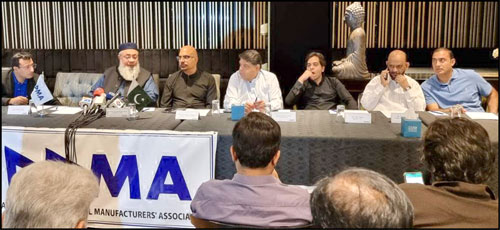Pakistan Pharmaceutical Manufacturers Association (PPMA) over the imposition of 17% sales tax over import of raw material has resulted in a 20 per cent shortage of daily use medicines including life-saving drugs across the country which has left millions of patients in distress.
Pharmaceutical companies have run out of raw materials, leading to 50 per cent shortage of medicines from next month, alarmed by PPMA Chairman Qazi Mansoor Dilawar. He said that the Pakistan Pharmaceutical Manufacturing Association demanded immediate increase in prices of medicines from 20% to 25% including refund of 17% sales tax on raw materials and refund of Rs 40 billion from FBR.
Accompanied by other PPMA leaders Asad Shuja-ur-Rehman, Dr Tahir-ul-Azam, Zahid Saeed, Khalid Munir Haseeb Khan, Uzair Nagra, Ehtesham-ul-Haq, Yasir Liaquat and Amir Saleem Butt, Qazi Mansoor Dilawar further said that they had been suffering from severe crisis for the last 6 months. Sales tax was imposed and promised to be refunded in this regard, both the governments have so far collected our refunds of Rs 40 billion which the government was not ready to give back due to which they had no any more resources to import raw materials.
Increasing prices of gas, electricity and petroleum products and manpower wages have led to a 45% increase in production costs.
He said that 95% of raw material for pharmaceuticals comes from abroad and the tariff per container has increased from US$1,000 to $9,000.
The prices of locally manufactured goods in the country were increasing day-by-day while the prices of medicines were not increasing at this rate.
He said that Pakistan’s pharmaceutical industry was not only exporting medicines but also meeting 90% of the country’s needs. If the industry is not taken into confidence, it is feared that Pakistan will have to import medicines worth $8-10billion annually, which will be 500% more expensive for the average patient than domestic medicines.










